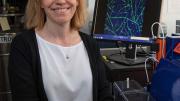As a 10-year-old, Amy Wagers knew she wanted to be a scientist, but it wasn’t until she registered as a bone-marrow donor during her senior year at Northwestern University that she decided to focus on stem cells. After receiving her Ph.D. in immunology and microbial pathogenesis from Northwestern, and completing a postdoctoral fellowship at Stanford with Irving Weismann, one of the earliest pioneers of stem-cell research, she became an associate professor of pathology and investigator at the Harvard-affiliated Joslin Diabetes Center. “I got into aging through the lens of stem-cell regulation,” she says. “There’s a linkage between the pathophysiology of aging and the pathophysiology of diabetes, particularly type 2 diabetes.” In 2008, Wagers moved to the new department of stem cell and regenerative biology, which she now co-chairs. “When I was a postdoc and I was applying for jobs in academia, my dad said, ‘When are you going to get out of school?’ and I said, ‘Well, hopefully never!’” If she isn’t working with students in her lab, the Forst Family professor of stem cell and regenerative biology is often found spending time with her six-year-old son, teaching or meeting with undergraduates enrolled in her course on aging—or sky-diving above Newport, Rhode Island. That practice unexpectedly became tradition when Wagers promised a colleague that if the very first paper out of her lab was published by the prestigious journal Nature, she would go skydiving to celebrate. “I was so exhilarated! Afterwards, I went to a little clam shack and had a beer and some fried clam strips and I was like, ‘I’m alive!’” Now Wagers invites graduate students whose work is accepted by high-impact publications to join her on a skydiving trip. So far, just one has accepted.
Harvard Portrait: Amy Wagers
Harvard Portrait: Amy Wagers
The skydiving Forst Family professor studies the pathophysiology of aging.

Amy Wagers
Photograph by Jon Chase/Harvard Public Affairs and Communications
You might also like
Five Questions with Nancy Gibbs and Thomas E. Patterson
The Washington Post laid off more than a third of its journalists. Does this signal a new era for newsrooms?
Harvard Magazine Questionnaire: The True Cost of Grade Inflation
A faculty committee is recommending changes to grading at Harvard College to limit an overabundance of A's. Add your voice to the conversation.
The Enterprise Research Campus in Allston Nears Completion
A hotel, restaurants, and other retail establishments are open or on the way.
Most popular
Explore More From Current Issue

Rabbi, Drag Queen, Film Star
Sabbath Queen, a new documentary, follows one man’s quest to make Judaism more expansive.

The Enterprise Research Campus in Allston Nears Completion
A hotel, restaurants, and other retail establishments are open or on the way.

Bees and Flowers Are Falling Out of Sync
Scientists are revisiting an old way of thinking about extinction.




